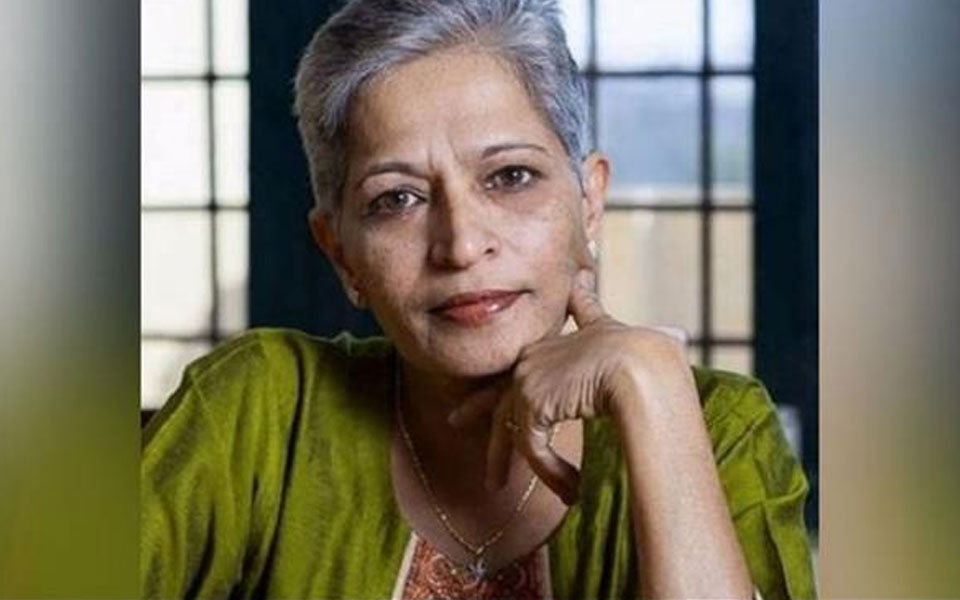Bengaluru : Over the last few years, a covert rightwing Hindutva group put as many as 22 Karnataka youths through training in the use of firearms so they could carry out assassinations of intellectuals, the nearly yearlong probe by a Special Investigation Team (SIT) of the state police into the murder of journalist Gauri Lankesh is learnt to have found.
Among these 22 youths was the man who allegedly shot at and killed Lankesh at the door of her Bengaluru home on September 5, 2017, police sources said.
Details of the training provided to the 22 youths — chosen from a larger group of nearly 60 individuals recruited to carry out subversive activities in Karnataka, including fanning communal hatred and triggering explosive devices — emerged after the arrests recently of four key persons involved with the recruitment and training process.
The four men arrested by the SIT are Amol Kale, 37, a former Pune convener of the Sanatan Sanstha-affiliated Hindu Janajagruti Samiti (HJS) and the alleged operations chief for the covert Hindutva group in Karnataka; Sujeet Kumar, 38, a former HJS activist; Rajesh Bangera, 50, a government employee and Sanatan Sanstha sympathiser who allegedly trained the youths using his licensed weapons; and Bharat Kurne, 37, of a fringe Hindutva group from Maharashtra called the Shiv Pratishtan Hindustan, and on whose 3-acre farm near Khanapur the arms training was allegedly provided.
The covert Hindutva group had also established a parallel network in Maharashtra and Goa, which was its primary area of operations, investigations by the SIT have revealed, police sources in Karnataka said. The radical Hindu Sanatan Sanstha is based in Goa. The arrests in Maharashtra on Friday of three individuals, including two who were closely associated with the Sanatan Sanstha and HJS, for allegedly plotting bomb attacks, is a fallout of the SIT’s findings on the existence of an extremist outfit behind the facade of a religious group.
Three of the 12 persons arrested by the SIT so far in connection with Lankesh’s murder — the alleged shooter Parashuram Waghmare, 26, a former Sri Rama Sena activist; and Ganesh Miskin, 27, and Amit Baddi, 28, both from Hubbali, and with a history of involvement in communal violence, who are accused of direct involvement in the shooting — were trained in the use of firearms at a vegetable farm run by Kurne alias Tomatar, SIT sources said.
Over the past few days, the SIT has also called in several persons, including Sandesh Shetty, 30, and Yuvaraj Kanchinadaka, 32, both of whom are linked to the Hindu Jagaran Vedike in Karnataka’s Mangaluru region, for their suspected involvement in the arms training.
“These two persons (Shetty and Kanchinadaka) were questioned and let off. They were called in for questioning on their links to the arms trainer Rajesh Bangera,” SIT sources said.
Some youths from Vijayapura, too, have been questioned for alleged links to the arms training programme at the Khanapur farm. The SIT will question each of the persons found to have undergone the training, and will prepare dossiers on them for monitoring by security agencies, police sources said.
The recruitment tactics of the covert Hindutva group in Karnataka whose members have been arrested for the Gauri Lankesh murder — and a plot to murder the Kannada writer and critic K S Bhagwan — is outlined in statements given to police by Sujeet Kumar, the former HJS activist who acted as the main recruiter for the group along with Kale, who was the operations chief.
As per a statement attributed to Sujeet Kumar — attached with the chargesheet filed on his role in the alleged plot to kill Bhagwan — the covert Hindutva group operates under great secrecy, using fake identities and an elaborate mechanism for communications to prevent detection by law enforcement agencies.
“We used deception tactics, so that if anyone from the group is caught, they alone are implicated and the group is not discovered,” says a statement attributed to Sujeet Kumar.
The covert group identified candidates for subversive underground activities through meetings of groups like the HJS, Sri Rama Sena and other Hindutva outfits before Sujeet Kumar interviewed them to test their commitment to establishing a Hindu Rashtra in India.
The most hardcore recruits would then be introduced to Amol Kale and a missing suspect, Nihal alias Dada, who would decide whether the recruit could be useful to the outfit, and what activities of the covert group they could be deployed for — including the use of guns to kill, and subversive activities like communal riots and bomb blasts — the SIT has found.
Sixty persons were recruited by Sujeet Kumar for the covert group in Karnataka over the last five years, sources in the SIT said. The group was also allegedly involved in similar activities in states like Maharashtra under the guidance of local leaders, SIT sources said.
“Maintaining secrecy is a prime focus for our group. When we recruit any youth for our activities we never give him our mobile numbers. We speak to them only through public phones initially. Once we are sure that a youth is suited to be a part of our activities we provide him with a mobile phone to be used for exclusive communication with us and we designate a code name for the youth for the communications,” Sujeet Kumar is quoted as saying in his statement.
After arresting Sujeet Kumar in May this year, the SIT found a stash of 22 mobile phones in the kitchen of the house that he occupied in Udupi in coastal Karnataka. Twenty-one phones were found in the possession of Kale when he was arrested. “These phones were used only for one-to-one communication with recruits. The recruits also had phones meant only for communicating with their recruiters. These phones would not be used to communicate with anyone else,” SIT sources said.
Investigations in the Lankesh case have revealed that the group’s recruits attempted to disrupt the screening of the film Padmavat and trigger communal tension in Belagavi last November. The SIT probe found in Kale’s possession a list of 34 people — mostly writers and rationalists — from around the country, who had been identified as possible targets for assassinations.
The Karnataka State Forensic Science Laboratory has concluded that both Gauri Lankesh and Kannada scholar Prof M M Kalburgi, 77, were killed with the same 7.65 mm country made pistol. Kalburgi was shot dead on August 30, 2015. Findings from the comparison of ballistic evidence from the Lankesh and Kalburgi cases also suggests that the 7.65 mm countrymade gun was also used in the shooting of the Leftist thinker Govind Pansare, 81, in Kolhapur in Maharashtra on February 16, 2015. The ballistic evidence also indicates that one of the two guns used in the Pansare murder was used to kill the rationalist Narendra Dabholkar, 69, at Pune in Maharashtra on August 20, 2013.
courtesy : indianexpress.com
Let the Truth be known. If you read VB and like VB, please be a VB Supporter and Help us deliver the Truth to one and all.
Bengaluru (PTI): The Karnataka government has issued directions to municipal corporations across the state to regulate and prohibit feeding pigeons in public places, citing serious public health concerns.
Deputy Secretary to Government V Lakshmikanth has written to the Urban Development Department requesting it to issue directions to the Greater Bengaluru Authority (GBA) and all municipal corporations to take immediate steps to implement the measures.
In an official note dated December 16 issued by the Health and Family Welfare Department and released to the media on Wednesday, the department said uncontrolled feeding of pigeons in public places has resulted in large congregations of birds, excessive droppings and serious health concerns, particularly respiratory illnesses linked to prolonged exposure to pigeon droppings and feathers such as hypersensitivity pneumonitis and other lung diseases.
ALSO READ: Chinese GPS tracker found on seagull near Karwar Coast
"The commissioner, the Greater Bengaluru Authority and the Commissioners and chief officers of other municipal corporations shall take necessary action to mitigate the causes of dangerous disease spread by pigeon and enforce specified guidelines in their respective jurisdiction," the note said.
According to the department, these include a prohibition on feeding pigeons or causing pigeons to be fed in areas where it may cause nuisance or pose a health hazard to the public. Pigeon feeding shall be permitted only in designated areas in a controlled manner, subject to certain conditions.
"The designated areas may be selected in consultation with stakeholders. The responsibility for upkeep of the designated areas and compliance to the directions shall be taken up by some charitable organisation or an NGO. The feeding in designated areas shall be permitted only for some limited hours in the day," it said.
The note further stated that authorised officers of local authorities shall issue on-the-spot warnings and may impose fines for violation of the order, or lodge complaints to prosecute offenders under Sections 271 (Negligent act likely to spread infection of disease dangerous to life) and 272 (Malignant act likely to spread infection of disease dangerous to life) of the Bharatiya Nyaya Sanhita.
It also directed local authorities to conduct public awareness campaigns, including the display of signboards, banners and digital messages, explaining the health hazards associated with pigeon droppings and feathers, the content of the regulatory directions and penalties for violations, and alternative humane methods of bird conservation that do not endanger public health.





